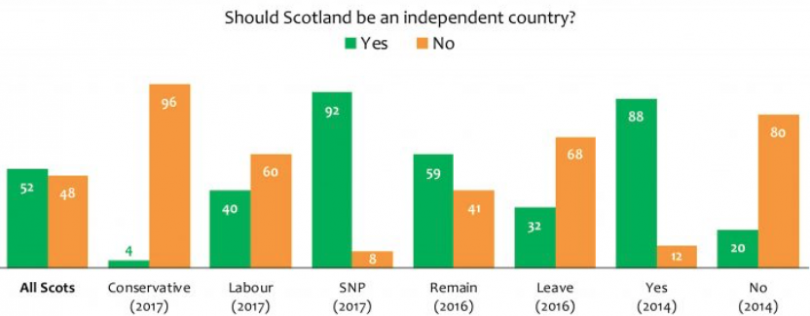A major poll carried out by Tory Peer and Pollster Lord Ashcroft has found that support for independence in Scotland has reached 52%.
This poll was carried out after the first week of Boris Johnsons premiership and demonstrates the instant increase in independence that has come not only from the idea of Johnson as Prime Minister but as a response to his clearly defined intention for the UK to leave the European Union on October 31st with or without a deal.
Asked how they would vote in such a contest, 46% said they would vote Yes to independence, and 43% No. Excluding those who say they don’t know or wouldn’t vote, this amounts to a lead of 52% to 48% for an independent Scotland.
Curiously the poll shows that 20% of 2014 No voters would now vote Yes but that 12% of Yes voters would now vote No. Clearly, Brexit has had an impact on both votes with some Yes voters favouring Brexit over independence but with far more moving the other way. The fact that 40% of 2017 Labour voters would now vote for independence must be a major blow for Scottish Labour.
This poll was carried out only a week into Johnson’s Premiership and the fact remains that many politicians continue to claim that Brexit can still be stopped or that there could be a second referendum on EU membership. That will mean that many potential Remain-voting No to Yes switchers have yet to make their minds up. When Brexit happens the Yes vote will jump again, possibly to around 56-58%.
The road to a second independence referendum, however, is likely to have another obstacle in the way in the form of a General Election. The EU will not budge on the deal they negotiated with Theresa May and so nothing can stop Johnson going for a No Deal Brexit. No Deal is the default position of the Westminster Parliament and to stop a No Deal the Parliament has very little time after it returns from recess on September 3rd.
With a parlimentary majority of only one and no majority amongst MPs for a No Deal Brexit, Johnson will lose any vote of No Confidence and so a General Election and therefore a request to the EU to postpone Brexit till after the result is now the most likely outcome.
Don’t underestimate Johnson though, he knows this and has been planning for it for months. His mantra of “Brexit on the 31st of October come what may” is designed to triangulate the Brexit party vote and the Brecon by-election where the Brexit Party vote cost the Tories the seat was tactically helpful to him. If Parliament blocks Brexit in any way he can tell all Leave voters who vote for his party and others that only a vote for him in a General election delivers Brexit and that a vote for the Brexit party gets Brexit cancelled. If his plan works and the polls indicate that it will – we will have a Tory hard Brexit majority before the end of the year.
We will also have independence support in the high 50s and an independence referendum can be called by the Scottish Parliament at that point. The date for the referendum? Well probably in September 2020.
This is only one scenario but it is looking the most likely one for now.
Full data tables available here
Become an Independence Ambassador








I noticed the poll didn’t include 16 and 17 year old voters, so I imagine the real figure was probably 2 or 3% higher for independence. Not sure if EU nationals were included in the poll either.
EU nationals are not included as it’s based on standard voting rules for general elections and it does not 16-18 years olds so in referendum conditions it would rise maybe 1% – despite young peoples mass support for independence they are less likely to vote that old folks and there are not so many of them.
On a sample of this size, there is a 3% margin of error – that’s why 52% is the key number – it’s not a statistical tie even if the poll is a rouge result, it’s still a yes win by 1%.
I had a look and 1% max and that’s based on old data on young people and EU citizens and if they are moving in the same way as the rest of the population then its good news.
I am led to believe that this poll excluded both 16 / 17 year olds and EU citizens. If that is true then this poll is possibly at the lower end of the possible true figures?